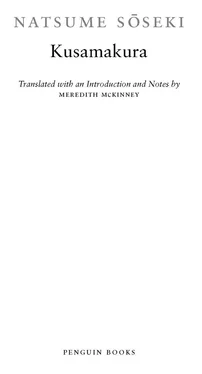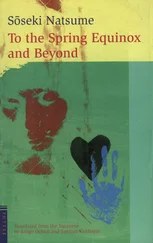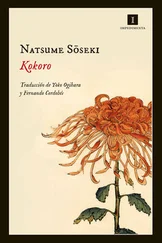Natsume Soseki - Kusamakura
Здесь есть возможность читать онлайн «Natsume Soseki - Kusamakura» весь текст электронной книги совершенно бесплатно (целиком полную версию без сокращений). В некоторых случаях можно слушать аудио, скачать через торрент в формате fb2 и присутствует краткое содержание. Жанр: Старинная литература, на английском языке. Описание произведения, (предисловие) а так же отзывы посетителей доступны на портале библиотеки ЛибКат.
- Название:Kusamakura
- Автор:
- Жанр:
- Год:неизвестен
- ISBN:нет данных
- Рейтинг книги:4 / 5. Голосов: 1
-
Избранное:Добавить в избранное
- Отзывы:
-
Ваша оценка:
- 80
- 1
- 2
- 3
- 4
- 5
Kusamakura: краткое содержание, описание и аннотация
Предлагаем к чтению аннотацию, описание, краткое содержание или предисловие (зависит от того, что написал сам автор книги «Kusamakura»). Если вы не нашли необходимую информацию о книге — напишите в комментариях, мы постараемся отыскать её.
Kusamakura — читать онлайн бесплатно полную книгу (весь текст) целиком
Ниже представлен текст книги, разбитый по страницам. Система сохранения места последней прочитанной страницы, позволяет с удобством читать онлайн бесплатно книгу «Kusamakura», без необходимости каждый раз заново искать на чём Вы остановились. Поставьте закладку, и сможете в любой момент перейти на страницу, на которой закончили чтение.
Интервал:
Закладка:
I open the door to leave, and there at the second-floor window, leaning against the sliding paper door, stands Nami. Her chin is buried in the col ar of her kimono, and only her profile is visible. Just as I am on the point of greeting her, her right hand rises as if lifted on a breeze, while the left hand continues to hang at her side. Something—is it lightning?—flashes swiftly up and down at her breast, there is a sharp click, and the flash is gone again. In her left hand I now see she’s holding the unvarnished wooden scabbard of a dagger. The next instant she has hidden herself behind the screen door. I leave the inn with the il usion that I have stopped in briefly on a morning performance at the Kabuki theater.
Turning left directly outside the gate, I’m soon confronted with a steep path that sets off almost perpendicularly straight up the mountainside.
Cries of bush warblers echo here and there among the trees. On my left the gentle slope that descends to the val ey is planted with mandarin trees; two low hil s stand to my right, apparently also devoted entirely to mandarin orchards. How many years ago was it that I visited here? I can’t be bothered counting. I remember it was a cold December, and it was the first time I’d come across a landscape of hil s swathed everywhere with mandarin trees like this. I asked one of the mandarin pickers perched in a tree if I could purchase a branch of them, and he replied cheerily, “Take as many as you want,†and began to sing an odd song. Back in Tokyo, I remember reflecting wonderingly, you had to go to a herbalist to come by so much as the skin of a mandarin. I heard a frequent sound of gunshot, and when I asked what it was, I was told that hunters were out shooting ducks. On that visit I had not the faintest inkling of Nami’s existence.
As an actor, she would make a marvelous female impersonator on the Kabuki stage. When most actors appear onstage, their performance is that of someone outside the home setting, but she spends her everyday life performing, and she doesn’t even recognize the fact. She’s a natural actor. Hers could truly be cal ed “the artist’s life.†Thanks to Nami, I am wel on the path to true painting.
Unless I view her behavior as performance, its unsettling nature wil doubtless plague me to distraction al day. An ordinary novelist, equipped with the standard tools of reason or human sentiment, would quickly find the study of this woman overstimulating and retreat in disgust. If any emotional entanglement were to develop between us in the real world, my suffering would no doubt be unspeakable. But my aim on this journey is to leave behind the world of common emotions and achieve the transcendent state of the artist, so I must view everything before me through the lens of art—apprehending people in terms of the Noh or other drama or as figures in a poem. Viewed from my chosen artistic perspective, this woman’s behavior is more aesthetical y satisfying than that of any woman I have come across, and it’s al the more beautiful for the fact that she is unaware of the beauty of her art.
Don’t misunderstand me. I maintain that it’s quite unreasonable to judge behavior such as hers simply as unbecoming in a citizen of our society. Yes, to do good, to be virtuous, to preserve chastity, to sacrifice oneself for the sake of duty are no easy matters. Al who attempt these things must suffer to achieve them, and if we are to brave such suffering, somewhere must lurk the promise of a pleasure great enough to defeat the pain. Painting, poetry, drama—these are simply different names for the pleasure within this anguish. When we once grasp this truth, we wil at last act with courage and grace; we wil overcome al adversity and be in a position to satisfy the supreme aesthetic urges of our heart. One must disregard physical suffering, set material inconvenience at naught, cultivate a dauntless spirit, and be prepared to submit to any torture for the sake of righteousness and humanity. Defined on the narrow basis of human sentiment, Art could be said to be a bright light hidden within the heart of us men of learning, a crystal ization of that fierce dedication that cannot but repel evil and cleave to the good, shrink from the warped and align itself with the straight, aid the weak and crush the strong—a crystal that wil shoot back the flashing arrows of the daylight world that would pierce it.
People wil laugh at someone’s behavior when they see it as theatrical. They are real y laughing at what is, from the point of view of human sentiment, the quite incomprehensible and meaningless sacrifice being made on the grounds of purity of aesthetic principle. They deride the fol y of parading one’s sensibility before the world rather than awaiting a moment that wil al ow innate beauty of character natural y to shine forth.
Those who have a true grasp of such matters may wel scoff, but the louts and riffraff who have no understanding of taste, and choose to scorn others by comparing them to their own base natures, are unforgivable. There was once a youth who leaped five hundred feet to his doom down a waterfal into the swirling rapids, leaving behind him a final poem on the rock above.2 To me, it seems that this young man sacrificed his life, that precious gift, for the sake of beauty pure and simple. Such a death is heroic, though the impulse that prompted it is difficult for us to comprehend.
But how can those who fail to grasp the heroism of that death dare to deride his action? Such people, who can never know the emotions of one who accomplishes such supreme heroism, must surely forfeit al right to scoff, for they are inferior to this young man in being unable, even in circumstances that justify such an action, to achieve his noble sacrifice.
I’m a painter and, as such, a man whose professional y cultivated sensibility would automatical y put me above my more uncouth neighbors, if I were to descend to dwel ing in the common world of human emotions. As a member of society, my superior position al ows me to instruct others.
Furthermore, the artist is capable of a greater aesthetic behavior than those who have no sense of poetry or painting, no artistic skil . In the realm of human feelings, a beautiful action is one of truth, justice, and righteousness; and to express truth, justice, and righteousness through one’s behavior is to align oneself with the pattern of behavior deemed proper for civic life.
Now, I have removed myself for a while from that sphere of human feelings, and during this journey I feel no necessity to rejoin it. Were I to do so, the whole point of the journey would be lost. I must sieve from the rough sands of human emotions the pure gold that lies within and fix my eyes on that alone. For now, I choose not to play my part as a member of society but to identify myself purely and simply as a professional painter, to cut myself loose from the entangling strictures of gross self-interest, and to dedicate myself ful y to my relationship with the artist’s canvas—and of course my disinterested stance applies also to mountains and to water, not to mention to other people. Under the circumstances, then, I must observe Nami’s behavior in the same way, simply for what it is.
When I have climbed about a quarter of a mile, a single white-wal ed dwel ing looms up ahead. A house among the mandarin trees, I think. The road now divides in two, and I turn left, with the white-wal ed house off to one side. I glance back and discover a girl in a red skirt climbing the hil behind me. The skirt gives way to a pair of brown shins, below which is a pair of straw sandals, advancing steadily toward me. Petals from the mountain cherries tumble about her head. At her back she bears the shining sea.
Читать дальшеИнтервал:
Закладка:
Похожие книги на «Kusamakura»
Представляем Вашему вниманию похожие книги на «Kusamakura» списком для выбора. Мы отобрали схожую по названию и смыслу литературу в надежде предоставить читателям больше вариантов отыскать новые, интересные, ещё непрочитанные произведения.
Обсуждение, отзывы о книге «Kusamakura» и просто собственные мнения читателей. Оставьте ваши комментарии, напишите, что Вы думаете о произведении, его смысле или главных героях. Укажите что конкретно понравилось, а что нет, и почему Вы так считаете.












